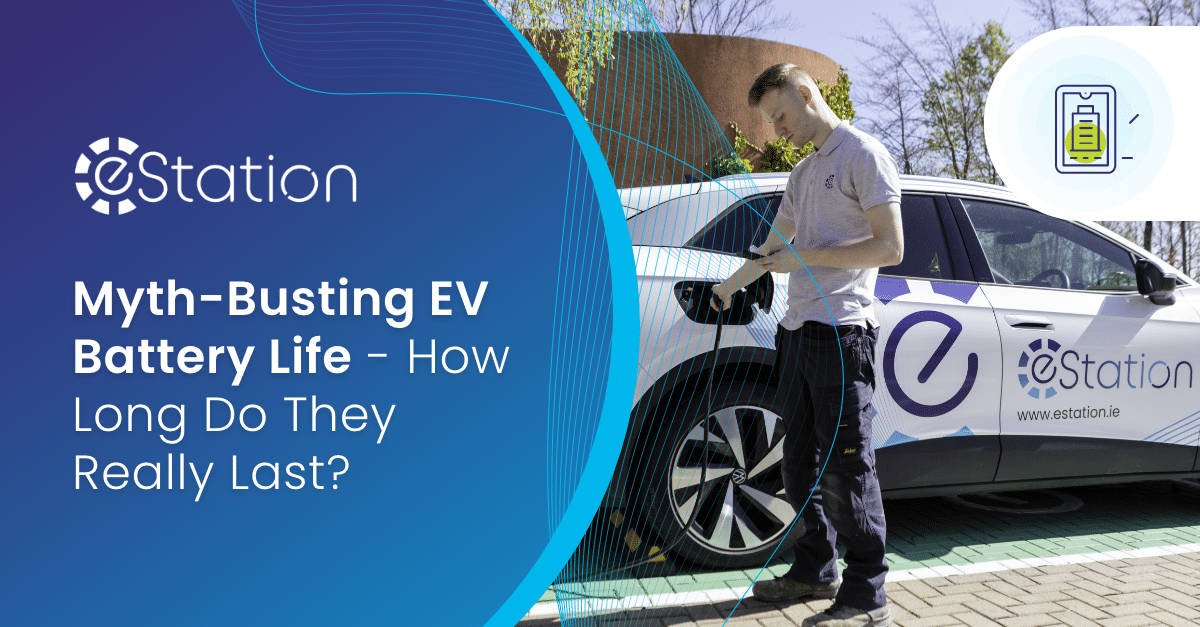
Electric vehicles have gained significant popularity in Ireland over the last few years. More and more people are now switching to a more sustainable and eco-friendly mode of transportation. According to the Society of the Irish Motor Industry new electric car registrations are up 49% this year alone!
While sales are on the rise we have found that one of the main concerns for drivers considering making the switch is the cost of the battery and how long it will last. In our latest blog, we bust some of the common myths around the lifespan of Battery Electric Vehicles (BEVs) and also Plugin Hybrid Electric Vehicles (PHEV’s).
Understanding Electric Vehicle Battery types
EV batteries are the heart of electric vehicles, powering their motors and enabling emission-free transportation. The two types of batteries for all PHEVs and BEV’s are a traction battery pack and a 12v accessory battery.
- Traction battery pack: is a collection of individual batteries used to power the electric motor of a battery electric vehicle (BEV) or plugin hybrid electric vehicle (PHEV). The traction battery delivers immediate, high-voltage energy to the electric motor that drives the EV.
- 12v accessory battery: is an additional battery in an EV that is responsible for supplying power to electrical components such as radios, lights, telematics, and other accessories, separate from the main battery used for powering the electric motor. It ensures a stable power supply for these accessories without draining the main battery.
So, what are the factors that affect EV battery Life?
Several factors play a role in determining the lifespan of an EV battery. Understanding these factors can help debunk misconceptions and ensure optimal battery performance:
- Extreme temperatures: both hot and cold, can impact battery life. High tropical-like temperatures can accelerate chemical reactions, leading to faster degradation, while very cool temperatures can reduce battery efficiency. Warmer climates affect the lifespan of a battery more than colder climates such as negatively affecting the range and battery lifespan, it does not affect the recharge time. Cooler temperatures can affect the recharge time but does not have any effect on the lifespan of the battery.
*It is important to note that most modern EVs come equipped with battery management systems that help regulate temperature and mitigate the effects of extreme temperature conditions.
- Charging: One common myth is that overcharging an EV battery can significantly reduce its lifespan. However, this is not the case. Manufacturers have designed EV’s with sophisticated charging systems that prevent overcharging. It is safe to leave your EV plugged in even after it reaches full charge, as the system will automatically stop charging. Regular charging within the manufacturer’s recommended voltage range is however beneficial for battery health.
- Depth of discharge: Another misconception is that fully discharging an EV battery or consistently shallow discharging can harm its longevity. As previously mentioned most modern electric vehicles are equipped with battery management systems that prevent full discharges and shallow discharges. It is generally recommended to maintain the state of charge (SoC) between 20% and 80% day to day to optimise the battery life of your electric vehicle.
How long do EV batteries last?
Over time, all batteries experience a gradual decline in their capacity and performance. This is a natural process known as battery degradation. It is essential to understand that battery degradation is a normal occurrence and does not render your EV useless. Manufacturers take battery degradation into account when designing EVs and often provide warranties that cover a certain level of capacity loss over a specified period. Many manufacturers have a warranty of 160,000km or 8 years on their batteries so this shows that it will take many years for your EV battery to decline. *Please check with your EV manufacturer for more information.
According to a Real-world study the data suggests that most modern EVs experience an average annual battery capacity loss of around 1-2%. This means that after several years of use, an EV battery may retain around 80-90% of its original capacity, which is still more than sufficient for daily driving needs. You can also find further information on battery life by the telematics provider GeoTab here.
So, what do we really think?
When it comes to the lifespan of EV batteries, it is important to separate fact from fiction. While EV batteries do experience gradual degradation over time, with proper care and adherence to recommended charging practices, EV batteries can offer reliable performance for up to 8 years. And as technology continues to advance, the longevity of EV batteries is expected to improve even further.
So, if you’re considering making the switch to an electric vehicle, rest assured that the battery is designed to last. You can embrace the future of sustainable transportation with confidence, knowing that EV battery life is no longer a barrier to enjoying emission-free driving.
Thinking of making the switch to electric? eStation has the tools to make the process seamless and efficient for you. Contact one of our experts today!